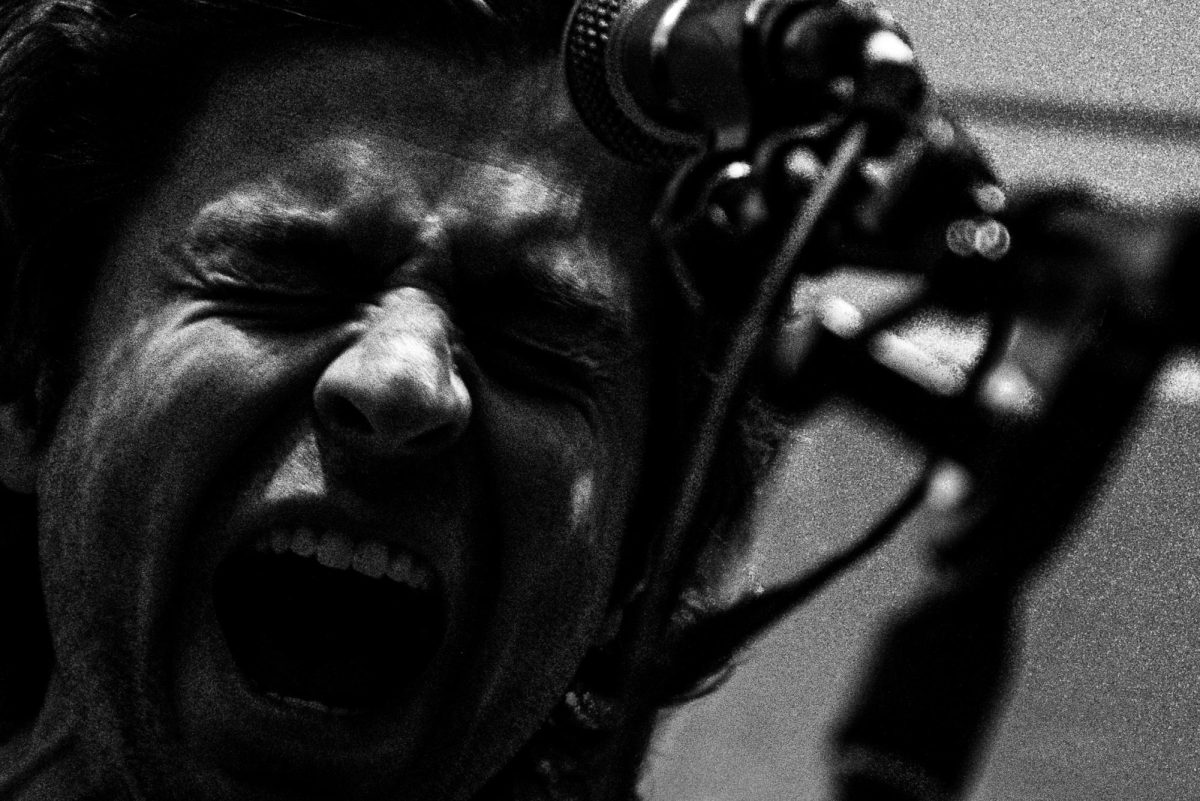Geology: Don Caballero Perfects Math Rock with "American Don"
September 24, 2013
 With 2000’s American Don, Pittsburgh natives Don Caballero have crafted the most technically and artfully advanced math rock album, perfecting the little-traveled genre that they helped pioneer seven years earlier as the bastard child of post-hardcore. Members at the time were Ian Williams on guitar, Damon Che on drums and Eric Emm on bass. Steve Albini engineered the album and is responsible for its distinct forceful, physical texture. While conventional instruments make the sounds, the result is anything but. The architects of the distinct approach are blatantly Williams and Che. Williams builds layer after layer of strangely-stitched, tapped guitar lines that shimmer with both harmony and dissonance, simultaneously working as the album’s rhythmic pacing. This frees Che to fill the leading role that a guitar normally takes. Che slams fill after fill, oscillating in and out of Williams’ angular backbone as he throws bright, explosive cymbal splashes and haymaker tom/snare hits that keep the listener permanently off-balance. Emm’s metallic, punchy bass acts as a bridge between guitar and drums, adding focus, color, muscle and body while filling the few frequencies not accounted for.
With 2000’s American Don, Pittsburgh natives Don Caballero have crafted the most technically and artfully advanced math rock album, perfecting the little-traveled genre that they helped pioneer seven years earlier as the bastard child of post-hardcore. Members at the time were Ian Williams on guitar, Damon Che on drums and Eric Emm on bass. Steve Albini engineered the album and is responsible for its distinct forceful, physical texture. While conventional instruments make the sounds, the result is anything but. The architects of the distinct approach are blatantly Williams and Che. Williams builds layer after layer of strangely-stitched, tapped guitar lines that shimmer with both harmony and dissonance, simultaneously working as the album’s rhythmic pacing. This frees Che to fill the leading role that a guitar normally takes. Che slams fill after fill, oscillating in and out of Williams’ angular backbone as he throws bright, explosive cymbal splashes and haymaker tom/snare hits that keep the listener permanently off-balance. Emm’s metallic, punchy bass acts as a bridge between guitar and drums, adding focus, color, muscle and body while filling the few frequencies not accounted for.
Despite their breakup very shortly after the release of American Don, Don Caballero had cemented their place as math rock demigods. Contemporary bands like Tera Melos, Giraffes? Giraffes! and Hella took the genre into the direction of chaos and noise, while others like Maps & Atlases and Foals added pop sensibilities to the weird time signatures. It’s nearly impossible to find a band borrowing elements from math rock that doesn’t have Don Caballero’s DNA in their sound, regardless of what else they’ve added to the formula.
Don Caballero has an incredible talent for breaking each song into distinctly separated sections. This structure is accentuated by their constant jumping between time signatures, sometimes switching with each measure. They’re able to build grooves that initially sound inside out, twisted and governed by some complicated, bizarre mathematical relationship. In this way, they share a common bloodline with bands like the Talking Heads. They’re able to both initially perplex and intrigue the listener. You want to examine each voice, each one entirely distinct from its companions, and contemplate their confusing synergy. Eventually, your ears accept it, as the concoction begins to feel more natural.

The Talking Heads comparison falls apart in that the Talking Heads will stay on their groove, allowing eventual comfort, while Don Caballero refuse the listener complacency. They allow for a glimpse of understanding in the full scene of the arrangement before beginning to tear away the guitar-looped limbs and rewrite time signatures until only a fragmented motif remains. The journey to understanding begins again as a new section is built from the corpse of the previous one. The progression feels entirely natural as each composition morphs and contorts, but skim through random snippets in any song and all semblances disappear.
To me, the magic of Don Caballero and American Don most notably is in their ability to constantly offer new revelations, no matter your familiarity with the band or the context surrounding them. Initially, you’re thrust into this entirely new dimension of music that sounds completely unique. Your ear catches warped glances of melody like a newborn observing its surroundings; entirely intrigued as the stimulation strikes some primal, previously unfulfilled appetite for sound. These moments resonate inside of you, satisfying a sonic taste that you were previously unaware of, but the reasoning behind beauty in this context is still entirely unknown. Like listening to an impassioned speech in a foreign language, as these moments of beauty drift by, you’re able to latch onto some in an entirely abstract way. You can feel the emotion and empathize on an entirely subconscious level, yet none of these words make any sense. The left side of your brain is rendered entirely useless, but the right side can connect to the speaker on a near telepathic level. There are no words on the album, letting the music express itself in ways unique to each listener. Time spent with the record readies you for the spastically shifting segments and increases awareness of the aural surroundings, strengthening the unexplainable attraction. You become able to deal with the brain’s initial impulse to reject the measures as dissonant and arrhythmic and as a result, more of these mysteriously pleasurable impressions reveal themselves until the entire album feels like a visit to an alternate musical universe, a vacation from music as you’ve become accustomed to.
American Don represents the sublime product created from precise, tight structure dictated by off-kilter, unnatural time signatures, yet the result sounds loose and free from convention in a way that few works of art, let alone music are able to tap into. It’s the intersection between ethos and pathos. This has always felt like math rock’s and Don Caballero’s ultimate goal, and it’s simply awe-inspiring to hear one of the founders of the genre reach this apex of expression.













